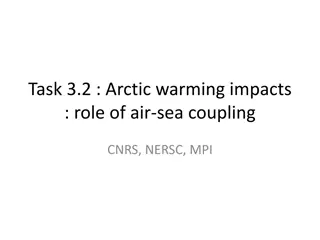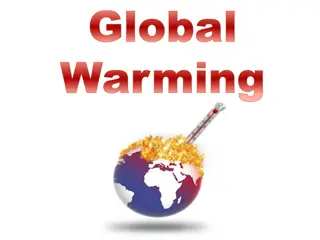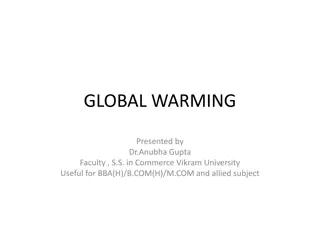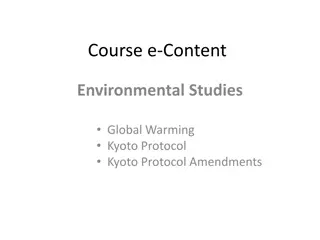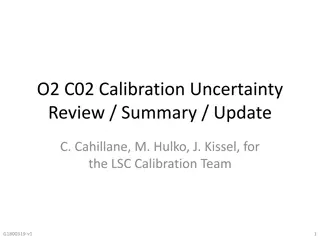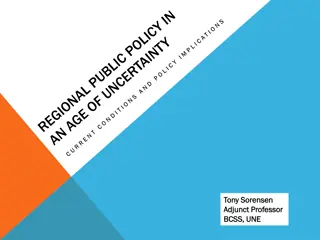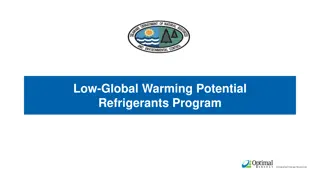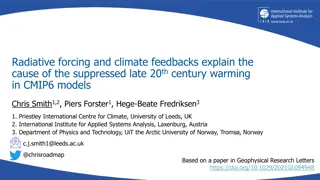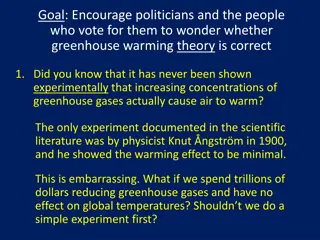Global Warming Theory: Complexity and Uncertainty
Global warming theory presents three main propositions, with uncertainty arising from factors such as the industrial revolution's impact on CO2 levels, aerosols' cooling and warming effects, and measurement errors impacting data accuracy. Alternative arguments question traditional views on evolution, highlighting complexities in scientific theories.
Download Presentation

Please find below an Image/Link to download the presentation.
The content on the website is provided AS IS for your information and personal use only. It may not be sold, licensed, or shared on other websites without obtaining consent from the author.If you encounter any issues during the download, it is possible that the publisher has removed the file from their server.
You are allowed to download the files provided on this website for personal or commercial use, subject to the condition that they are used lawfully. All files are the property of their respective owners.
The content on the website is provided AS IS for your information and personal use only. It may not be sold, licensed, or shared on other websites without obtaining consent from the author.
E N D
Presentation Transcript
The Complexity Obstacle to Knowledge Group 3
Things to discuss According to Franklin, what are the three main propositions of global warming theory? Where does the uncertainty lie in these propositions and why?
Suppose due to randomness, some giraffes are born with longer necks. Majority assumption would be that they are able to eat more high foliage -> survival of the fittest But during dry season, giraffes generally feed from low shrubs -> does not support Darwin s theory of evolution
Consider an alternative argument: males fight for dominance by using their necks and it is usually the longer neck male giraffes that are victorious -> sexual selection is perhaps a better explanation than Darwin s theory of evolution Highlights that the theory of evolution can be full of complexities
Three Main Propositions Of Global Warming The world has been warming unusually in recent decades. There are no known natural causes for global warming. The burning of fossil fuels is necessary and sufficient to explain why it happens.
Proposition 1 - complexity 1760 - 1820 : Industrial Revolution Led to rise in CO2 which increased global temperature Dip in 1940 - 1970 General consensus: dip is due to increase use of man-made aerosols which cancelled out effect of greenhouse gases Aerosols aid in formation of clouds, and is known to possess cooling property
Proposition 1 - complexity However, it was later found out that there are other kinds of aerosols that can cause increase in temperature Aerosols, particularly black carbon, can alter reflectivity by depositing a layer of dark residue on ice and other bright surfaces. In the Arctic especially, aerosols from wildfires and industrial pollution are hastening the melting of ice. 2008: dip was due to measurement error, which raised doubts about how accurate the data was
Proposition 2 Is the increase in temperature caused by the burning of fossil fuels ? Physics shows that CO2 and methane acts as greenhouse gases which trap atmosphere heat from the earth that could otherwise be escape into space. However, direct rise in temperature as a result of the greenhouse gases (eg. CO2 and CH4) are much lesser than observed.
Proposition 2- complexity Main cause of rising temperature: Increase water vapour in the atmosphere (caused by global warming) multiplies the warming effect. How many times it multiply ? The interaction between cloud formation and aerosols, the trapping of heat, the reflection of solar radiation creates uncertainties as to the total increase in water vapour. nature of a feedback hard to predict however it extends Degree of warming to be expected is approximately, what is observed is reasonable, but quantitative uncertainties are substantial
Proposition 3 From the figure, it can be seen that the amount of carbon dioxide being released by burning of fuels is quite large as compare to the rest. The atmosphere does not contain a great deal of matter, as such any large influx of carbon dioxide is dangerous. There is also a positive corelationship between temperature and carbon dioxide.
Uncertainty in Proposition 3 However, after a close inspection on the Intergovernmental Panel On Climate Change(IPCC) report it can be seen that global warming actually happened first, followed by the rise in carbon dioxide 800 years later. There are currently no explanations or reasoning given by the IPCC to explain the phenomenon. Researches then suggest making comparison with Mars to get a better understanding. But, Mars is probably not a good comparable case as there is insufficient information about the climate change in Mars.
Conclusion Majority of the view of the scientific expert is well ahead However due to the high complexities of the evidence, serious problem are raised Take away message: behind every piece of evidence that is presented, there may be some factors that are neglected which may simplify the complexity of the issue at hand.







